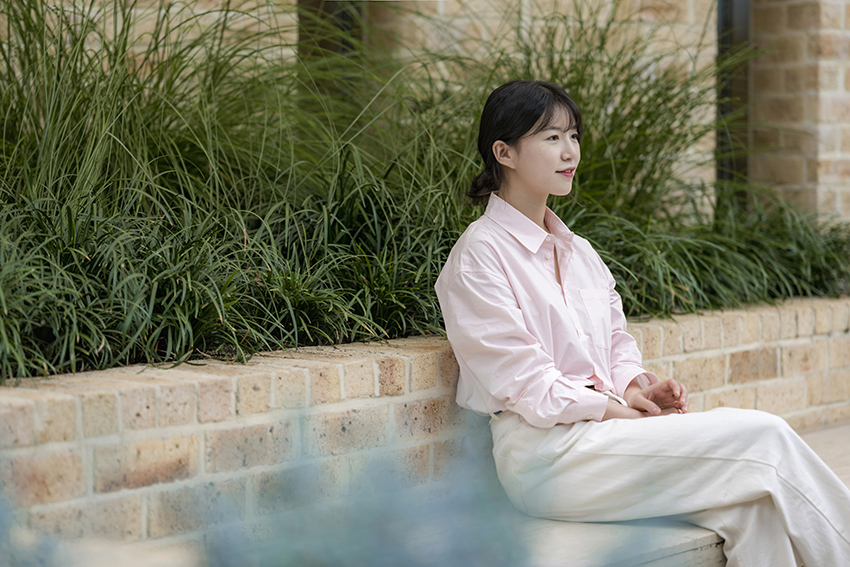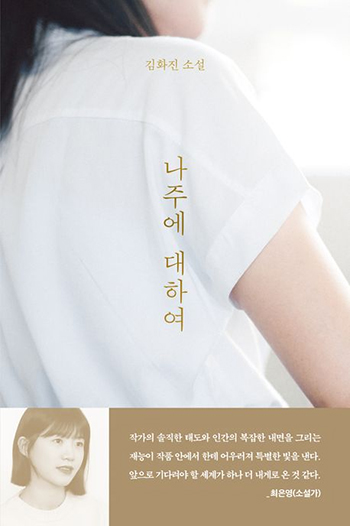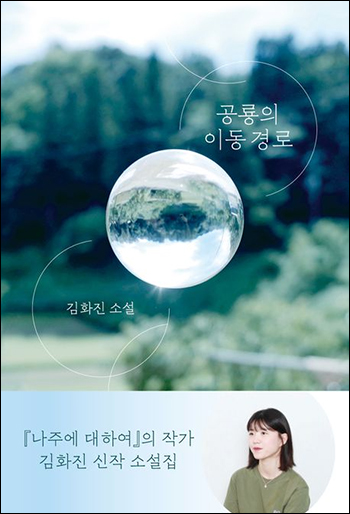|
Korean Authors
Writer Kim Hwa-Jin The mind of reading, writing, and making books
2024.03.11
At the start of every year, Korea searches for new stars of Korean literature through Shinchunmunye, an annual spring literary contest organized by Korean media outlets that openly accepts literary entries and promotes new writers. As long as the program has existed, it has discovered many outstanding literary figures and reflected the characteristics of each era. Writer Kim Hwa-Jin, who debuted in 2021 through Shinchunmunye and won the Korean Artist Prize in 2023 with her first short story collection, including the work that won the contest, is recognized as a young writer who best captures the current era. As a reader, writer, and literary editor, she is a person who is sincere about reading, writing, and making books. That is what makes Kim Hwa-Jin’s appearance all the more welcome to literary readers. The following is an interview with Kim Hwa-Jin, who works diligently and wholeheartedly to publish books. We heard about her work, life, and future goals.

It’s a pleasure to have you with us on K-Book Trends. Please say hello to our readers and briefly introduce yourself.
Hello, everyone. I’m Kim Hwa-Jin. I’m a literary editor at a publisher, and I also write books. I published About Naju (Munhakdongne) and short story sequence The Migratory Path of Dinosaurs (Swimming Kul). It’s good to meet you all.

Last November, you won the 47th Korean Artist Prize for your first short story collection, About Naju. As you began your career after winning the 2021 Shinchunmunye with the same-titled story About Naju included in the collection, it must be a very meaningful work for you. Please tell us more about the award and what the book is about.
While I love short story collections, I am very happy to have won the prize that is only given to writers’ first book with my short story collection. I didn’t expect anything like this, and it made me feel the joy of something unexpected approaching me. Each work is a little different in what I wanted to capture, but in general, About Naju is a collection of stories that I have been preoccupied with for years: the subtle and intricate distances between people and minds. We may or may not accept others depending on our age, situations, circumstances, and conditions. I have always been curious about the invisible timing and the relationship between people who exchange influences. I guess you can say it’s a collection of stories about the different minds that “only matter to me.”
About Naju

You are both a writer and an editor at a publishing house. Was there a particular incident that inspired you to become a writer?
I have loved the form of novels since I was about 20, because I liked the idea of something that seems similar to reality but feels a little different when you are inside it. And the sense of being contemporary with the people who create it was a sort of strange relief for me in my 20s. I joined a publishing house thinking I wanted to be one of them, and I started writing fiction after work for my own pleasure. I had thought I wanted to be a writer, but I think it was more like wanting to make use of things I created. And I didn’t expect it to actually happen, although I liked the “writing me” better than the “not writing me.”

Making a book as an editor must feel different from making a book as a writer. Are there any differences in your mindset or approach to working as an editor and a writer?
It’s completely different, but there is a pretty good separation. I feel a little more tense when I work as an editor and a little more free when I write fiction as a novelist. I like that transition - going back and forth.

The books you want to make as an editor must be different from the books you want to write as a writer. As a writer, what is the message you want to convey through your books?
It is not that different. I only want to make it into a book when the manuscript I read is good literature. There are as many reasons why some literary works are good as there are writers, and I want to make good literary works into books for their own reasons. I want my novels to be published on that basis. So, in that sense, as an editor and as a writer, I think there are two messages I want to put in my books: There are so many other people in the world, and books come to you at the right time.
When I find a book that makes me happy after reading it, it brings me joy and satisfaction.

As a part-time writer, it must be important to balance your day job with your writing. We are curious to know how you allocate the time for writing and how you balance the two jobs.
I don’t really have any other hobbies, so writing fiction in my spare time after work is still good enough for me. As long as I have the willpower and stamina, I can write the story I like and eat what I want for dinner with a sense of satisfaction. I don’t really need a certain kind of space, or it has to be quiet, or anything like that. I just have ideas for stories in my head, take notes on my phone, go to a cafe near my house and write them down in a notebook, and organize what I have written in greater detail on the days I have my laptop with me. But, that is just the way it is on the days I write, and usually, when I get off work, I just lie down. It is a bit of a shame because I don’t write super hard and frequently.

Your short story collection, The Migratory Path of Dinosaurs, published last year, is a sequence about the relationships between friends told through four main characters. Each story resonated as if it were the story of someone close to you. Do you usually find inspiration for your work from your surroundings?
I think I slowly reflect on moments like the air of one particular day that I can‘t forget over time, or moments when everyone else seems to be natural, but I’m the only one who feels unnatural. There are many things that make me feel unnatural: feeling angrier, sadder, nervous, happy for no reason, or disappointed more than necessary when I’m with people. I don’t remember what the other person was like in the memory, but the emotions were clear - I realized that I was creating characters as I thought about what those emotions were and why. So, I think I often find ideas for my works around me and within myself, as you said.
The Migratory Path of Dinosaurs

You have been mainly writing short stories until now, but do you also have plans for full-length novels? If so, what would it be about?
Yes, I’m thinking about it. I think full-length novels will likely be about similar topics and characters as short stories. One of the things I’m sure of is that I have been very awful at making friends for more than half my life. I think that’s something that I have been thinking about all along, and now that I’m writing novels about them, I’m thinking about doing a little bit more of it. I want to write about people who wanted to be friends and people who had trouble being friends. But, because I think I have written a lot of short stories about people who didn’t end up being friends, for full-length stories, I would like to write about people who do end up being friends.

“Being around what you love. That is all I want,” you once said. What are some of your favorite things these days?
I don’t know why I feel so happy and satisfied when I find a book that makes me happy to read, especially novels. Recently, I read The Eccentric Family by Tomihiko Morimi (森見登美彦) upon recommendation, and it was the best novel that fit my current state of mind perfectly. It’s about a family of raccoons that are cute, funny, sad, and even daring. And for comics, I loved Tomoko Yamashita’s (ヤマシタトモコ) Different Country Diary. For some reason, when a novelist is featured in fiction, I find myself rooting for them. It’s about a novelist aunt who takes in her nephew who suddenly loses his parents in an accident, and it was just the right blend of sweet, supportive, and ideal story for me. These are some of my recent favorites.
I want to be a person who has something that matters, even if it’s only important to myself.

Please tell us about some of your favorite writers or works.
The novelist whose next book I’m looking forward to reading is Lim Seon-U, who has published short story collections such as Through the Mind of a Ghost (Minumsa) and Green is Anywhere (Jaeum & Moeum Publishing). When Lim writes, you can’t help but nod your head without a second thought, even if people would turn into camels, jellyfish, and trees in his story (all of these are things that happen in Lim’s novels.) I think he is a writer who is good at capturing things like sadness and love that are deeply embedded in the hearts of people who don’t seem to expect anything special from life through exquisite fantasy.

We look forward to your next books as you delicately capture our society through your straightforward sentences. Last but not least, tell us about your plans and goals for the future.
On a small scale, I want to write more entertaining and reckless novels, and on a larger scale, I want to do what I want to do. To do that, I think I need to be a person who likes good things and is tolerant of other people’s judgments. I think what I write in fiction and who I want to be are probably very similar. I want to be a person who has things that matter to me, even if they are only important to me. I want to be a person who can think that other people also have such things, and I want to write novels about them.
#Kim Hwa-Jin#Shinchunmunye#Literary editor#About Naju#The Migratory Path of Dinosaurs |
Pre Megazine
-

Jakkajungsin Publishing Co.
VOL.69
2024.04 -

Writer Yun Jung-Eun
VOL.69
2024.04 -

Jumping Books Publishing House
VOL.68
2024.03 -

Writer Kim Hwa-Jin
VOL.68
2024.03 -

Publisher Hyohyung
VOL.67
2024.02 -

Writer Minha
VOL.67
2024.02 -

Almond Publishing
VOL.66
2024.01 -

Writer Kwon Jung-Min
VOL.66
2024.01 -

Hakgojae Publishers
VOL.65
2023.12 -

Writer Kim Hye-Jung
VOL.65
2023.12 -

Eidos Publishing House
VOL.64
2023.11 -

Writer Hwang In-Chan
VOL.64
2023.11 -

Munhakdongne
VOL.63
2023.10 -

Writer Chang Kang-myoung
VOL.63
2023.10 -

Happywell Publishing
VOL.62
2023.09 -

Writer Baik Soulinne
VOL.62
2023.09 -

Dasan Contents Group (Dasan Books)
VOL.61
2023.08 -

Writer Lim Kyoung-Sun
VOL.61
2023.08 -

SpringSunshine Publishing Co.
VOL.60
2023.07 -

Writer Lee Kyung-Hye
VOL.60
2023.07 -

Human Cube
VOL.59
2023.06 -

Doctor Jeong Jae-Seung
VOL.59
2023.06 -

Anonbooks
VOL.58
2023.05 -

Writer Son Bo-Mi
VOL.58
2023.05 -

Namhaebomnal
VOL.57
2023.04 -

Writer Kim Bo-Young
VOL.57
2023.04 -

Hugo Publishing
VOL.56
2023.03 -

Writer Cho Kwang-Hee
VOL.56
2023.03 -

Balgeunmirae Publishing Co.
VOL.55
2023.02 -

Writer Lee Byung-Ryul
VOL.55
2023.02 -

Wisdom House, Inc
VOL.54
2023.01 -

Writer Jeong Jia
VOL.54
2023.01 -

Humanitas
VOL.53
2022.12 -

Writer Kim Yeon-Su
VOL.53
2022.12 -

Songsongbooks
VOL.52
2022.11 -

Writer Eun Hee-Kyung
VOL.52
2022.11 -

Bombom Publishing Co.
VOL.51
2022.10 -

Writer Jiwon Yu
VOL.51
2022.10 -

Hangilsa Publishing Co., Ltd.
VOL.50
2022.09 -

Writer Kim Won-Young
VOL.50
2022.09 -

Moksu Publishing Company
VOL.49
2022.08 -

Writer Yoo Sun-Kyong
VOL.49
2022.08 -

Next Wave
VOL.48
2022.07 -

Writer Park Sang-Young
VOL.48
2022.07 -

A Thousand Hopes
VOL.47
2022.06 -

Writer Bora Chung
VOL.47
2022.06 -

Woongjin ThinkBig
VOL.46
2022.05 -

Dr. Oh Eun-Young
VOL.46
2022.05 -

JECHEOLSO Publishing House
VOL.45
2022.04 -

Writer Jang Ryu-Jin
VOL.45
2022.04 -

Changbi Publishers
VOL.44
2022.03 -

Writer Kim Ho-Yeon
VOL.44
2022.03 -

Mati Books
VOL.43
2022.02 -

Writer Lee Kkoch-Nim
VOL.43
2022.02 -

Picturebook Gongjackso
VOL.42
2022.01 -

Writer Kim Sang-Wook
VOL.42
2022.01 -

Writer So-yeon Park
VOL.42
2022.01 -

Writer Yoo Eun sil
VOL.42
2022.01 -

Kungree Press
VOL.41
2021.12 -

Writer Kim Lily
VOL.41
2021.12 -

Writer Park Yeon-jun
VOL.41
2021.12 -

Writer Yi Hyeon
VOL.41
2021.12 -

A deeper world told through picture books 'Iyagikot Publishing (Story Flower)'
VOL.12
2019.06 -

Author Jeon Min-hee
VOL.12
2019.06 -

Illustrator Kim Hwan-Young
VOL.13
2019.07 -

Travelers sailing through the sea of knowledge - 'Across Publishing Group Inc.'
VOL.13
2019.07 -

Genre Novel Publisher 'Arzak Livres'
VOL.14
2019.08 -

Author Lee Yong-han
VOL.14
2019.08 -

Wookwan Sunim
VOL.15
2019.09 -

East-Asia Publishing
VOL.15
2019.09 -

Author Jo Jung-rae
VOL.16
2019.10 -

EunHaeng NaMu Publishing
VOL.16
2019.10 -

Writer Heo Kyo bum
VOL.40
2021.11 -

Writer Kim So-Young
VOL.40
2021.11 -

Author-illustrator Kim Sang Keun
VOL.40
2021.11 -

ACHIMDAL BOOKS
VOL.40
2021.11 -

Author Kang Gyeong-su
VOL.17
2019.11 -

Moonji Publishing Belongs to the Literary Community
VOL.17
2019.11 -

Author Kim Yun-jeong
VOL.18
2019.12 -

I-Seum
VOL.18
2019.12 -

Kim Cho-Yeop
VOL.19
2020.02 -

Creating a window into the future with books
VOL.19
2020.02 -

Author Serang Chung
VOL.20
2020.03 -

Hey Uhm
VOL.20
2020.03 -

Writer Lim Hong-Tek
VOL.21
2020.04 -

BIR
VOL.21
2020.04 -

Writer Song Mikyoung
VOL.39
2021.10 -

Author-illustrator Kim Dong Su
VOL.39
2021.10 -

Writer Lee Seula
VOL.39
2021.10 -

Tabi Books
VOL.39
2021.10 -

Writer Kim Soo-hyun
VOL.38
2021.09 -

Author-illustrator Lee Myoung Ae
VOL.38
2021.09 -

Writer Hwang Sunmi
VOL.38
2021.09 -

Kidari Publishing Co.
VOL.38
2021.09 -

Writer Sohn Won-Pyung
VOL.22
2020.05 -

Woods of Mind's Books
VOL.22
2020.05 -

Writer Heungeul
VOL.23
2020.06 -

Gloyeon
VOL.23
2020.06 -

Maumsanchaek
VOL.24
2020.07 -

Winners of the 2021 Bologna Ragazzi Award
VOL.37
2021.08 -

Picture book artist Lee Suzy
VOL.37
2021.08 -

Author-illustrator Yi Gee Eun
VOL.37
2021.08 -

Hubble
VOL.37
2021.08 -

Writer Baek Se-Hee
VOL.25
2020.08 -

Bearbooks Inc.
VOL.25
2020.08 -

Author Baek Hee-Na
VOL.26
2020.09 -

Yuksabipyoungsa
VOL.26
2020.09 -

Writer Kang Hwa-Gil
VOL.27
2020.10 -

Kinderland (Bandal)
VOL.27
2020.10 -

Writer Ha wann
VOL.36
2021.07 -

Author-illustrator Myung Soojung
VOL.36
2021.07 -

Writer Jung Yeo-Wool
VOL.36
2021.07 -

Publisher EcoLivres
VOL.36
2021.07 -

Writer Lee Geumi
VOL.28
2020.11 -

Sakyejul
VOL.28
2020.11 -

Writer Kim Keum-Hee
VOL.29
2020.12 -

Geulhangari
VOL.29
2020.12 -

Writer Cheon Seon-Ran
VOL.30
2021.01 -

Hyang Publishing House
VOL.30
2021.01 -

Writer Lee Hee-Young
VOL.31
2021.02 -

Sanzini
VOL.31
2021.02 -

Publisher Prunsoop
VOL.32
2021.03 -

Writer Sim Yun-Kyung
VOL.32
2021.03 -

Hanbit Media
VOL.35
2021.06 -

Hyeonamsa
VOL.33
2021.04 -

Author-illustrator Noh Inkyung
VOL.33
2021.04 -

Writer Cho Won-Jae
VOL.35
2021.06 -

Writer Kim Jung-Mi
VOL.34
2021.05 -

Safehouse Inc.
VOL.34
2021.05












